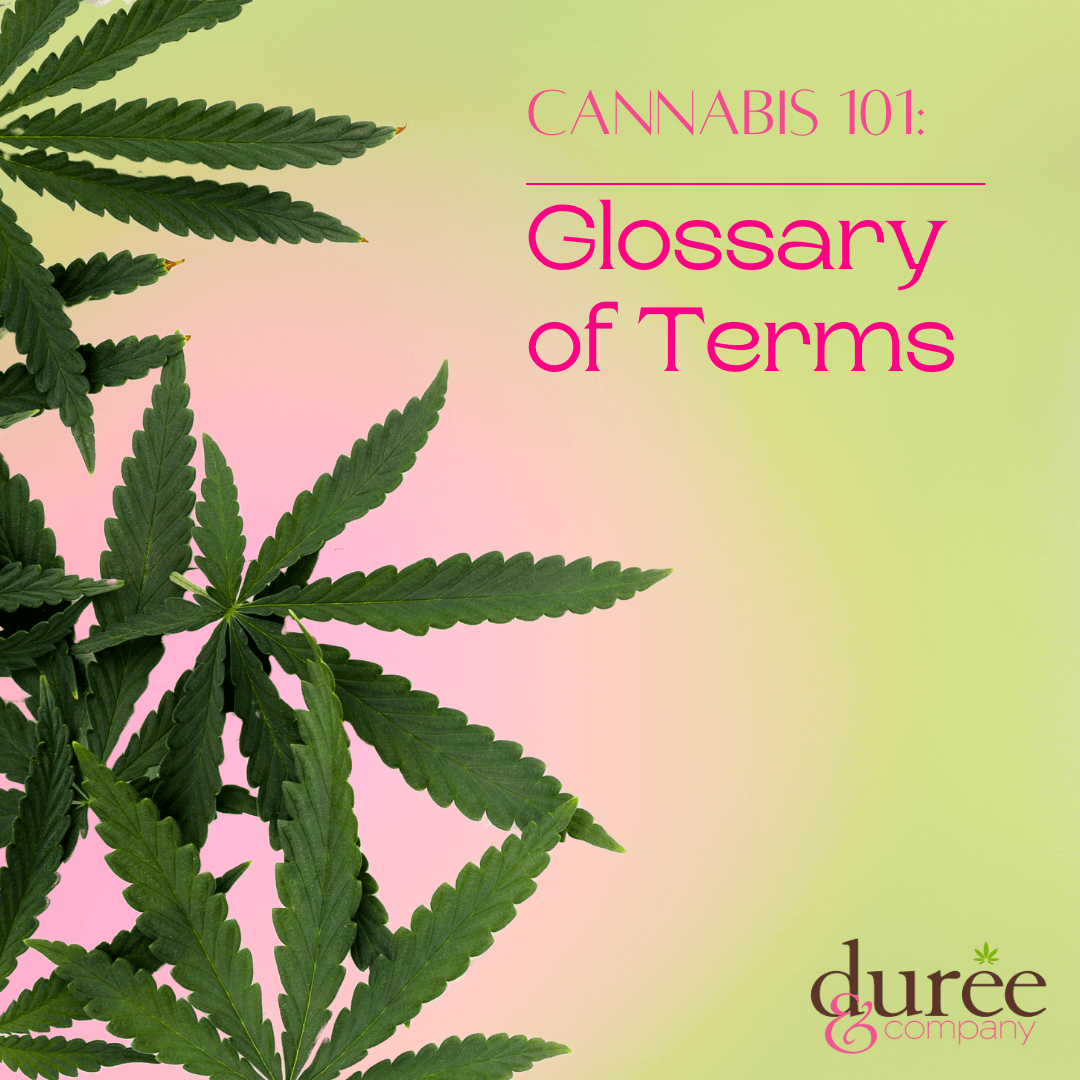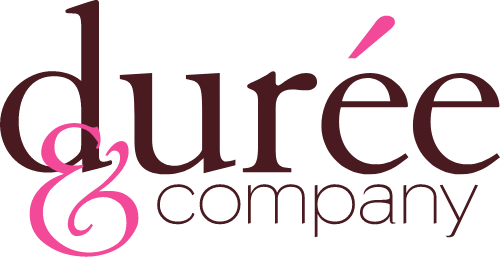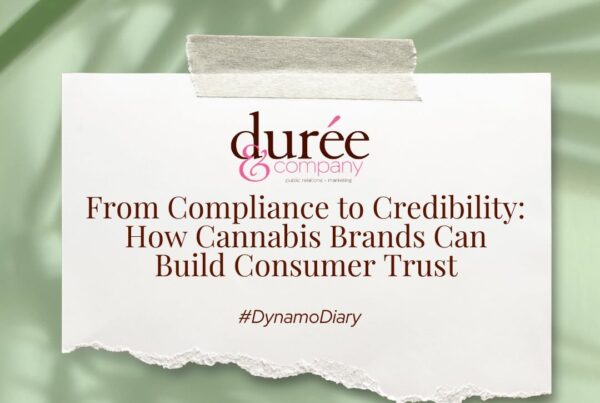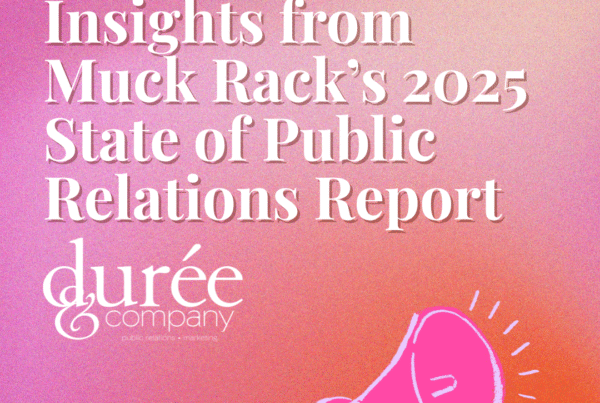
The cannabis industry continues to grow at exponential rates and is quickly captivating the attention of many. The U.S. cannabis market is expected to reach $45.8 billion in sales by 2025, according to Headset, a provider of data and analytics focused on the cannabis industry. Major companies in the cannabis and hemp industries are focused on sustained growth as changes are made in legislature and product development.
Although the cannabis industry continues to grow, there are still many questions such as, “What’s the difference between CBD and THC?,” “What’s Delta-8?,” “What’s the difference between recreational and medical cannabis?” and much more.
We at Fort Lauderdale and Aspen-based public relations and marketing agency Durée & Company continue to be at the forefront of emerging markets including cannabis, and are sharing our glossary of cannabis terminology.
420: 420 is a slang term referring to marijuana or marijuana use. It has come to signify the date of April 20 as an “unofficial” holiday linked to cannabis. Similarly, 710 and July 10 focuses on highlighting cannabis in all its forms, particularly oils, concentrates and dabs. The holiday got its date to resemble OIL (710 upside-down).
Budtender: The employees of a dispensary from whom consumers purchase cannabis products. The ideal budtender is knowledgeable about the variety of products available, has a polite and professional demeanor, and may provide personal recommendations should a customer ask.
Cannabis: Cannabis is a unique plant that produces psychoactive, medicinal, and therapeutic effects when consumed. The legal status of medical and recreational cannabis varies among states.
Concentrate: Cannabis concentrates are substances in which the more desirable properties of cannabis, such as cannabinoids and terpenes, have been isolated. There are many cannabis concentrates in a variety of formats and textures.
Cultivation: Cannabis cultivation refers to growing cannabis. Cannabis cultivation can occur outdoors, however it is much more likely to be indoors in a hydroponic, soilless set-up.
Delta-8 THC: Delta-8 is one of the 112+ cannabinoids found in hemp and cannabis. It’s gaining popularity due to its highly potent medicinal properties. Many say that Delta-8 THC produces euphoric effects similar to Delta-9, however Delta-8 is less potent than Delta-9. Each individual state in the United States is currently determining the legality of Delta-8.
Delta-9 THC: Delta-9, often referred to as THC, is the primary active component of cannabis, which is classified at the federal level as a Schedule I controlled substance. Delta-9 has psychoactive effects and is found at high concentrations in medicinal and recreational marijuana, and in relatively low concentrations in hemp.
Delta-10 THC: Delta-10 is a cannabinoid found in trace amounts in the cannabis plant. Reports have shown that similar to Delta-9, Delta-10 can get you high, but it is less potent than Delta-9.
Dispensary: A cannabis dispensary is a retail store where someone can access cannabis for medical or recreational purposes.
Extract: A cannabis extract is a specific type of cannabis concentrate. While concentrates can be made through various mechanical processes, extracts are unique because they are made exclusively through the use of a solvent.
Flavonoids: Flavonoids are phytonutrients responsible for plant pigments, flower coloration, taste, smell and overall sensory experience. Flavonoids also deliver therapeutic benefits.
Flower: Flower, commonly known as bud, refers to the smokable, trichome-enriched part of a cannabis plant. Flower is the most popular form of cannabis consumption due to its versatility and methods of use.
Grow: To grow is to become or cause something to become larger in size or to undergo the natural process of developing.
H4 CBD: According to ACS Laboratory, Hexahydrocannabidiol (H4CBD, THD, HHCBD, or hydrogenated CBD) is a synthesized hydrogenated form of CBD. Manufacturers create H4 CBD by adding four hydrogen atoms to CBD molecules to convert some of the double bonds into single bonds. This process causes a chemical reaction that changes the active cannabinoid into a different, usually stronger one. As a result, H4 CBD is a more potent form of CBD.
HHC: Hexahydrocannabinol, also known as HHC, is a legal hemp derivative, like Delta-8 THC and Delta-10 THC, that has shown to deliver mild psychoactive effects. However, unlike Delta-8 and Delta-10, HHC is not a tetrahydrocannabinol. It’s an unregulated chemical class known as hexahydrocannabinol, produced through hydrogenating Delta-8 using metal catalysts.
Medical Cannabis: Medical marijuana is a term for derivatives of the cannabis sativa plant that are used to ease symptoms caused by certain medical conditions. The U.S. federal law prohibits the use of marijuana, however, many states allow medical use to treat pain, nausea and other symptoms.
Medical Marijuana Treatment Center (MMTC): An MMTC is a vertically-integrated establishment approved under a medical use marijuana license that acquires, cultivates, possesses, processes, transports, sells, distributes, dispenses, or administers marijuana, products containing marijuana, related supplies, or educational materials for medical purposes.
Multi-state Operator (MSO): A multi-state operator (MSO) is any cannabis company that has operations in multiple states. Commonly using vertical integration, multi-state operators own cultivation facilities, extraction/processing facilities, and cannabis retail venues in some of the most highly populated, affluent cities across the states that have legalized cannabis for medical or recreational use.
Pre-roll: A pre-roll is a pre-assembled, ready-to-smoke joint sold in dispensaries and recreational stores. Pre-rolls are great for those who are unable to roll joints for themselves, and since they usually have the weight (in grams) listed on the label, it’s easy to know how much is being consumed.
Recreational: Legal cannabis not designated for medical purposes is often called recreational or adult-use cannabis. Recreational users consume cannabis for a pleasurable altered state of consciousness, similar to the use of alcohol or tobacco. Laws for recreational and adult-use often vary from state to state, and in some cases, they can vary between cities.
Seed-to-Sale: Also known as vertical integration, seed-to-sale refers to the entire production chain of a cannabis company. Cannabis companies start by planting the seeds on their farms, they grow the plants, harvest those plants, process everything, and then package it before it goes to the customer.
Strain: A strain refers to the named variations of cannabis that differ in appearance, aroma, and effect. Cannabis grows natively in different regions of the world and has been selectively bred for various characteristics. Cannabis strains that have been crossbred are called hybrids, which make up a vast majority of cannabis available today.
Terpenes: Terpenes are a diverse group of organic compounds produced by plants. Terpenes give cannabis its variety of aromas and flavors as well as modulate the effects of cannabinoids like THC and CBD by working together in what’s known as the entourage effect.
THC: An abbreviation for tetrahydrocannabinol, the main psychoactive ingredient in cannabis that is responsible for the “psychoactive” effects.
THC-O Acetate (THCOa): An acetylated form of THC, THCOa does not naturally occur in hemp or cannabis plants. It’s not a THC isomer like Delta-8 or Delta-10. It’s a derivative of hemp. THCOa can be produced from Delta-8 or Delta-9 THC. To create it, chemical reactants, as well as a catalyst, are needed.
Vape: Vaping cannabis involves inhaling heated oil or concentrate through a vaporizing device, most often a vape pen. Vape pens are portable, require nearly no set up or messy cleanup, and can be quickly puffed and discreetly put away.
For our list of CBD terminology, visit our blog, the ABCs of CBD!
If you’re emerging in your market – be it cannabis, hemp or another trendsetting industry – we are right there on the cutting edge with you. Contact us today, or visit our cannabis- and hemp-specific website for more information.
Want to know more? Watch this video for a look at some of the clients and the media coverage we have secured.
About Durée & Company
Durée & Company, Inc. is an award-winning, full-service public relations, marketing and special events firm founded in 1999. The firm has offices in Fort Lauderdale and Aspen, Colorado. Durée & Company serves the corporate, agency and nonprofit practice areas for local, national and international clients. Services include public relations, social media, marketing, content development, advertising, special events, branding, radio promotions and more. Durée & Company clients include well-known names in business, fashion, hospitality, travel, health and wellness, cannabis and hemp, psychedelics, technology and cryptocurrency, marine and yacht, art and culture, nonprofit organizations, legal and professional services and real estate. Durée & Company is a member of PR Boutiques International™ (PRBI), an international network of boutique PR firms. To learn more, call 954-723-9350; go to dureeandcompany.com; cannabismarketingpr.com; or psychedelicpr.com. Join the social conversation and follow Durée & Company on Facebook, Instagram, Twitter, YouTube and LinkedIn at @DureeCoPR.








